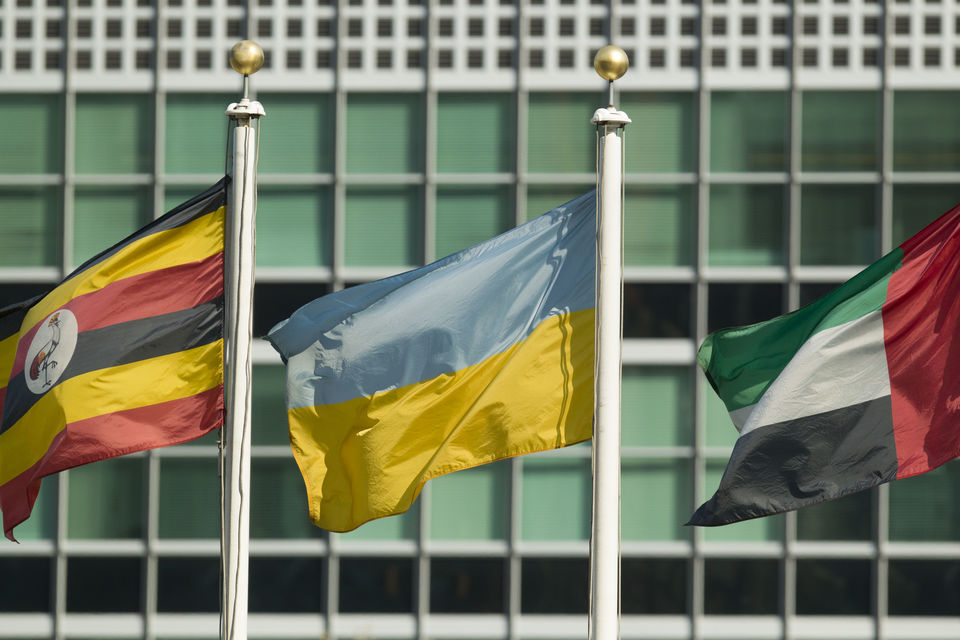Виступ делегації України на дебатах Першого комітету ГА ООН щодо регіонального роззброєння та безпеки

Mr. Chair,
Ukraine is an advocate of maintaining peace and security with the lowest possible level of armaments, including conventional ones. We recognize the important role of conventional arms control, including at the regional and subregional levels, and, accordingly, welcome all respective measures in this field. Ukraine’s consistent commitment to strengthening the effectiveness of confidence building measures (CBMs) also remains unchanged.
With this in mind, Ukraine supports and co-sponsors draft resolutions — “Conventional Arms Control at the Regional and Subregional Levels” and “Confidence Building Measures in the Regional and Subregional Context” tabled by Pakistan. We also support the draft “Information on Confidence Building Measures in the Field of Conventional Arms” submitted by Argentina.
Mr. Chair,
Ukraine participates and complies with its obligations under different pan-European confidence-building mechanisms related to the conventional arms control such as the Treaty on Conventional Armed Forces in Europe (CFE Treaty), the Open Skies Treaty and the OSCE Vienna Document on Confidence and Security Building Measures.
We attach great importance to bilateral CBMs with neighboring countries developed according to the Vienna Document. To date, the relevant bilateral agreements are implemented by Ukraine, on the one side, and Poland, Belarus, Hungary, Slovakia and Romania, on the other.
Unfortunately, Ukraine’s former proposals to enter into a similar agreement with Russia were not accepted by this country. It is also regrettably that, by launching its military aggression against Ukraine, the Russian Federation created an impasse for sub-regional military cooperation and confidence-building arrangements between the Black Sea littoral states, in particular the BLACKSEAFOR and the Confidence and Security Building Measures in the Naval Field in the Black Sea.
Moreover, in 2007, after termination of its participation in the 1990 Treaty on Conventional Armed Forces in Europe that put in place to reduce the risk of major armed conflict, Russia has been avoiding information exchange and verification control, especially on the situation in the Southern Military District of Russia. Destabilizing accumulations of personnel and military equipment in this area enabled the Russian military invasion to Georgia in 2008 and aggression against Ukraine continuing right now. As a result of this hostile activity, conventional arms control and CBMs regimes do not currently apply on the occupied territories of the Autonomous Republic of Crimea and certain areas of the Donetsk and Luhansk regions of Ukraine.
What is even more alarming, this is the progressing militarization of these territories by Russia. The continuing destabilizing transfers of weapon systems, ammunition and military personnel to the territory of Ukraine is the matter of our deep concern.
The occupation and subsequent militarization of the Crimean peninsula led to the expansion of the area of use of Russian warships and military aircraft in the Black Sea region and far beyond in the entire Mediterranean basin. Thus, such activity has far-reaching consequences for security not only in the Black Sea area, but in the whole South Europe, as well as in the North Africa and the Middle East.
The Russian Federation also actively militarizes the Sea of Azov by increasing the number of warships and their expansion to the whole territory of the Sea. As an example, in October 2018, the Russian government allocated a designated area in the Sea of Azov to the Russian Defense Ministry. This area is located only 65 km from the city of Mariupol — one of the largest seaport cities of Ukraine.
The progressing militarization of the Sea of Azov has implications not only for maritime trade and supplies into Ukraine, but also poses an additional military threat to Ukraine. The illegal construction of the Kerch Strait bridge between Russia and temporarily occupied Crimea has substantially contributed to this threat, in particular by facilitating further militarization of Crimea and involvement additional Russian maritime and other forces to the area under the pretext of protection of the bridge and its infrastructure.
The international community has no right to turn a blind eye to this alarming situation and the illegal and aggressive activity of the Russian Federation. It should continue to urge this country to withdraw its military forces and personnel from Ukraine’s territory and to stop their illegal occupation.
Thank you.
